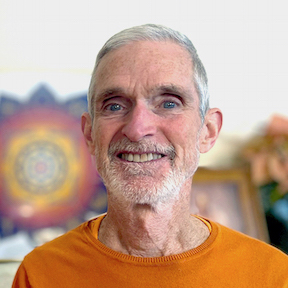by Swami Ramananda
The month of September contains two of the most important holy days in the Jewish tradition, Rosh Hashanah and Yom Kippur. Rosh Hashanah begins a 10 day period of introspection and repentance that culminates in Yom Kippur, known as the Day of Atonement. These holy days remind us that seeking forgiveness and offering forgiveness to those that have offended us, are two of the most important ways to free our hearts from the past and the psychic knots that can restrict our ability to give and receive love. With this in mind, we decided to practice forgiveness for the month of September.
I am going to write here about the process of forgiving others, which can be very difficult, but can also be very healing. If we have been deeply hurt, we may have no interest in forgiving someone or it may seem impossible. But an inability to forgive usually means carrying inside a toxic energy of anger and ill-will that darkens the heart and keeps us connected to the very person from whom we may wish to be free.
Correctly understood, forgiveness is a conscious process of releasing resentful feelings. It frees us from being emotional victims of others, allows our hearts to breathe, and moves us one step closer to experiencing the natural flow of compassion that arises when blockages are removed.
Forgiveness does not mean condoning someone’s behavior, allowing them to be irresponsible or abusive, or letting them back into our lives. It does not mean being nice to the person you forgive–or even talking to them. Because it’s primarily an inner process, we can practice forgiveness and still take appropriate action to correct someone, set boundaries to protect ourselves, or even press charges.
A significant obstacle to forgiveness is the presence of anger, rage, grief or fear that may prevent us from acting skillfully. We may be more comfortable directing our fury toward someone than facing those painful feelings within ourselves. Inflicting suffering on others may feel good or justifiable temporarily, but it won’t heal our wounds or offer real peace to our hearts.
Resolving painful emotions requires that we acknowledge them without shame or self-judgment. Emotions are meant to move through us. In order to feel safe enough to experience them, we may need support, particularly if our own mindfulness is not strong enough to be fully present to our pain without getting lost in it. As we untie these emotional knots, we recover our perspective and clarity, and often see the hard lessons that our suffering has taught us.
This effort to reflect on and release painful feelings lays a foundation for the process of forgiveness. As we learn to face our own impulses and reactions, it becomes easier to understand the actions of others. Forgiveness then becomes a practice of looking beneath the surface of a person’s behavior to acknowledge the deeper spiritual essence that is worthy of our respect.
Looking deeply, we may recognize that many of our interactions with each other are unconsciously based on protecting our self-image, trying to control the ever-changing world around us and win the acceptance of others. We can practice having compassion for the ways that we all suffer from our attempts to arrange for happiness, reminding ourselves of the innate goodness within, like the light beneath a lampshade. We can also acknowledge the ways we may have hurt others when we’ve been preoccupied with our own safety and desires, and in this spirit of compassion, forgive ourselves for these mistakes.
Forgiving ourselves is a significant step toward understanding the actions of others that have hurt us. We can practice looking with eyes of compassion and releasing bitterness from our hearts, seeing both someone’s behavior and their deeper spiritual Self. It may help to envision such a person as a child, full of hopes and dreams and shaped by the various traumas of human life.
Forgiveness might become easier when we understand that those who made us suffer are no doubt suffering themselves. And we may need to practice numerous times breathing into our hearts, letting go of our anger and trusting that their own suffering will bring them the lessons they need to heal and be whole.
As we make this effort to forgive, we move from responding to another person’s ego-identity to acknowledging their true nature. We begin to erode the confines of our own ego and release the armor around our hearts, accepting ourselves and others as we are. We begin to experience a deeper source of happiness—one that comes from knowing our connection with all of life–and to feel the natural impulse to love and give that engenders a profound peace.
You can join Swami Ramananda & Swami Asokananda for Satsang: Awakening Our Hidden Strengths Sat. SEP 9 @ 11:00 am – 12:30 pm PT.
Or, join Swami Ramananda for A Study of Yoga & Eckart Tolle a 3-part workshop Mondays: SEP 11, 18 and 25th @ 6:00 pm – 7:00 pm PT , or his new monthly series called Tuesday Tea Time starting on Tue. SEP 12 @ 11:15 am – 11:45 am PT.
Swami Ramananda C-IAYT, E-RYT 500, is the Executive Director of the Integral Yoga Institute in San Francisco and a greatly respected senior teacher in the Integral Yoga tradition, who has been practicing Yoga for over 45 years. Ramananda offers practical methods of integrating the timeless teachings and practices of Yoga into daily life, and transforming the painful aspects of human experience into steps toward realizing one’s full potential.
He leads all levels of Yoga teacher trainings and programs around the globe. Ramananda co-developed the Stress Management Teacher Training program and has trained many teachers to bring Yoga into corporate, hospital and medical settings. He a founding board member of Yoga Alliance and is a co-founder of The Spiritual Action Initiative which brings together individuals committed to working for social justice for all beings and for the care and healing of our natural world. His warmth, wisdom and sense of humor have endeared him to many.


